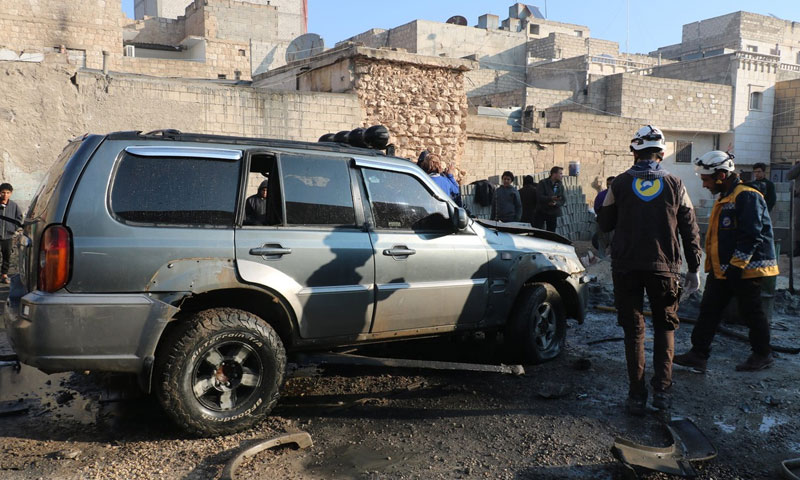Police and national public security forces in the city of Azaz, north of Aleppo, warned civilians and gas cylinder distributors of new targeted killing tactics in the area through gas cylinder bombing.
The police leadership issued a statement, indicating that those whom it called “terrorists” are behind the new targeted killing tactics. In a statement, the police urged civilians and gas cylinder distributors to pay attention during the process of receiving and delivering empty gas cylinders which might be packed with explosives.
Security authorities in the city of Azaz were able to detect an explosive cylinder, placed among gas cylinders. They returned it to one of the gas cylinder filling factories in the northern countryside of Aleppo, after receiving information about the intention of the People’s Protection Units (YPG) to invent a new targeted killing method; emptied-out propane cylinders are packed with explosives.
A police source, who declined to reveal his name, spoke to Enab Baladi about the booby-trapped cylinders. The source pointed out that “this new targeted killing tactic is very solid and well-thought-out and very hard to detect.” The security authorities successfully managed to get the explosive cylinder away from people and set it off safely without causing any damage or injuries, according to the source.
The police department also requested civilians to report of any cylinder or foreign body that is in doubt via calling the special tipline assigned by it.
Last September, the military police in the city of Azaz warned of a method of detonation that relies on a minor detonation, where a number of civilians gather, to be followed by another massive explosion, aimed at causing maximum civilian casualties.
Safety procedures
The Syrian Civil Defense (SCD) distributes leaflets such as “Do not come close. Do not touch! Tell the SCD” in the northern countryside of Aleppo, warning citizens not to touch unexploded ordnance, mines, improvised explosive devices or car bombs.
The SCD puts up warning signs on the explosive devices or the suspected bodies, asking civilians to leave the suspicious sites. Moreover, if a suspected object is found, it is required not to touch it or attempt to neutralize it until the competent team arrives. Furthermore, people are supposed to stay away from the site at 100 meters (0.6 miles) as a minimum.
The SCD noted in its leaflets to the signals that could indicate the existence of explosive devices in a ploughed land, abandoned disconnected wires, derelict buildings, animal carcasses or in the scattered objects.
The security system also launched several security campaigns in response to a bomb threat, and in an attempt to reduce the risks resulting from bombings.
Over the past months, repeated bombings occurred in the cities of rural Aleppo and al-Hasakah, targeting popular markets, assassinating military figures in the region via car bombs or improvised explosive devices “ locally prepared by agents, whether by the Syrian regime or the cells of the Islamic State or the PKK”, according to a previous statement made by Youssef Hammoud, Syrian National Army’s official spokesman to Enab Baladi.
Bombardment and explosions in the opposition-held areas in rural Aleppo and al-Hasakah have intensified after the Turkish military operation in the eastern region of the Euphrates (Operation Peace Spring), which began on 9 October, amid mutual accusations between the Turkish Ministry of Defense and the Kurdish People’s Protection Units on the responsibility for those bombings.
The Turkish Ministry of Defense accuses the “YPG” of being behind the bombings. On the other hand, Mustafa Bali, the spokesperson and director of media relations for the SDF, considered that “the Turkish-backed mercenaries are now trying to displace the remaining Kurdish population from their homes, through random explosions in civilian areas.”

